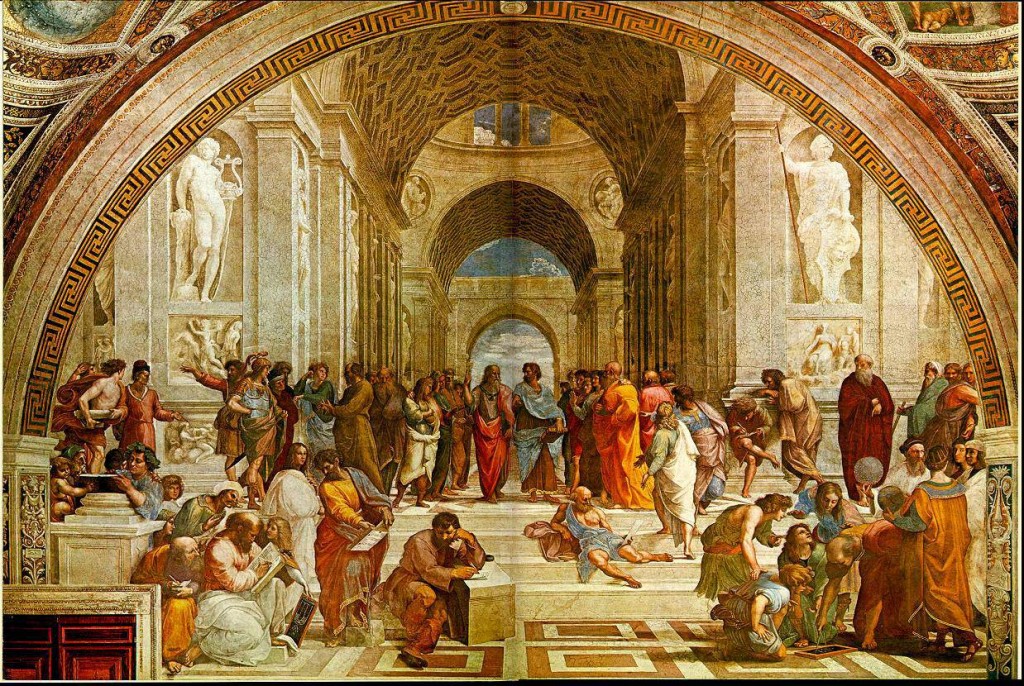
Paganism doesn’t have any commandments, like the Abrahamic religions, but if we did, I think the First Commandment of Paganism would be “Thou shalt not judge another’s experience”. And I think this is a problem.
Experiences vs. Interpretation
When Jason Mankey interviewed me recently on his Raise the Horns podcast, he mentioned that he would never tell someone that their interpretation of their experience is wrong. The statement took me aback a little, and I responded lamely with something like “Right, that will never come across well.” The truth is I don’t have a problem telling people I think they are wrong. I am entirely comfortable with criticizing other people’s interpretations of their experiences, and I welcome people to do the same for me. That is not to say that I will necessarily always have an answer for them, but I appreciate the questioning. When done in a spirit of openness and humility, the process of question benefits both sides in the conversation, and the community as a whole.
I have frequently heard Pagans condemn those who would call their religious experiences into question, but I have always taken refuge in the distinction between judging other people’s experiences and judging other people’s interpretations of their experiences. Jason’s statement surprised me because he seemed to imply that even questioning another person’s interpretation of their experience would be wrong, and I don’t agree with that. I won’t tell another person that they didn’t feel what they felt, but I will question the meaning they have assigned to their experience. Admittedly, this can often feel like the same thing to the person whose interpretations are under scrutiny, but I think it is an important distinction. The willingness of Naturalistic Pagans* like myself to critically question others’ interpretations of their religious experiences is, I think, of the biggest barriers in communication between Naturalistic Pagans and other Pagans. On the whole, it seems that Naturalistic Pagans don’t respect the First Commandment of Paganism.
Since leaving my religion of origin (Mormonism), this distinction between experience and interpretation, has been a touchstone for me. When I left the LDS Church, I realized how I had been manipulated by the obfuscation of this distinction. I had religious experiences while I was Mormon, and the LDS church taught me one way to interpret those experiences, but did so in way that hid the interpretive step. To give you an example, Mormon missionaries ask those who are considering joining the LDS Church to read the Book of Mormon and then pray and ask God if it is true. If the person experiences any kind of positive feeling when praying, then that is interpreted by the missionaries as an affirmation from God that the Book of Mormon is true, … and that Joseph Smith was a prophet of God, and that the LDS church is the “one and only true church”, and that the person needs to be (re-)baptized as a Mormon. That is a lot of densely packed interpretation that needs to be unpacked.
To be authentic I had to realize that there were other possible interpretations for my experience than the ones readily available from my religious community. Since leaving the Mormon church, I don’t doubt the experiences I had there, but I do question how I interpreted those experience. Nowadays, I still have religious experiences, but I am much more tenuous about my interpretations. As William James wrote, such experiences “determine attitudes though they cannot furnish formulas, and open a region though they fail to give a map. At any rate, they forbid a premature closing of our accounts with reality.”

A Place for Constructive Criticism
A few years ago, at Pagan Spirit Gathering, in a workshop on ritual design I attended, Sparky T. Rabbit made the case for a constructive form of ritual critique, which he argued was necessary to make our Pagan rituals better. He observed, though, that this runs against the grain of Pagan culture, where the one rule everyone implicitly agrees on is that we cannot question or criticize another’s practice. The result, he suggested, is mediocrity in our rituals. I would say the same thing about our theology: So long as we agree not to question or criticize one another’s beliefs, we are bound to have an immature theology — one articulated in an echo chamber of our voices and those that agree with us.
Even if we agree that our experiences are not subject to critique (that’s a subject for another post), our interpretations of our experiences most definitely should be. And distinguishing between the two is essential for any mature theology. As James Madison wrote, “When the Almighty himself [or, to translate that in Pagan language, “the Mighty Ones”] condescends to address mankind in their own language, his meaning, luminous as it must be, is rendered dim and doubtful, by the cloudy medium through which it is communicated.” To refuse to acknowledge this interpretive step is hubris.
Why are some of us so sensitive that they cannot “tolerate” critical questioning of our beliefs? I sometimes wonder if, in some cases, the Pagan taboo against proselytizing arises out of an unconscious fear that, if we put ourselves out there, someone will ask hard questions about our beliefs. I wonder if the lack of developed theology in Paganism is, not the result of a commitment to praxis, as we claim, but a fear of criticism. And I wonder if the kind of “tolerance” we advocate is not, in some cases, an excuse for insularism. I would rather see the First Commandment of Paganism be, “Thou shalt keep an open mind.” And this would be observed by both sides in any conversation. On the one hand, it would protect against groupthink and unconscious orthodoxies. And on the other hand, it would protect against destructive forms of criticism which are born of a need to be right about everything.
I recognize that everyone needs safe spaces where they can talk about their experiences, and their tentative interpretations of those experiences, without fear of criticism, constructive or otherwise. But if that’s where we choose to stay, then those “safe spaces” become intellectual ghettos. If we really want to avoid orthodoxy, as we claim, then we need to have more discussion, not less — and some of that discussion needs to be constructively critical. We Pagans need to more comfortable with idea that criticism can be constructive. And so long as we avoid all criticism, we will be vulnerable to groupthink. Sometimes it is only the best of our friends that challenges us to ask the hardest of questions about ourselves and our experiences. And it is precisely those experiences which seem to come with ready-made interpretations that we most need to examine critically if we are to lead religiously authentic lives.
* As the term is used here, Naturalistic Pagans includes Humanistic Pagans, Atheistic Pagans, Atheopagans, and other non-theistic Pagans.















